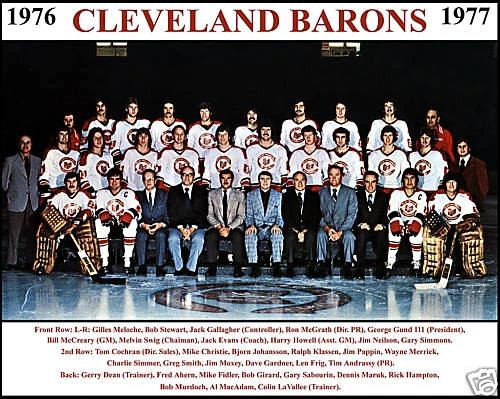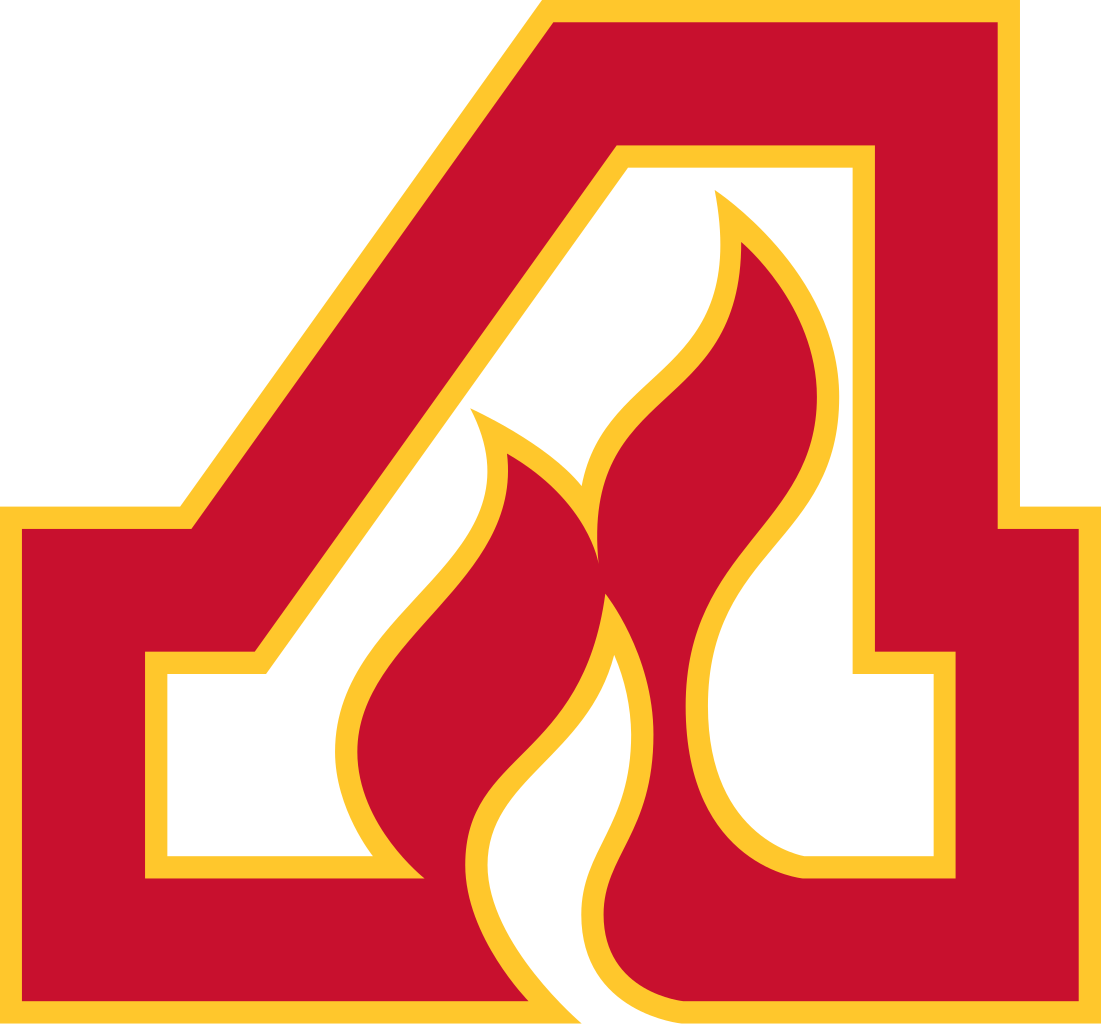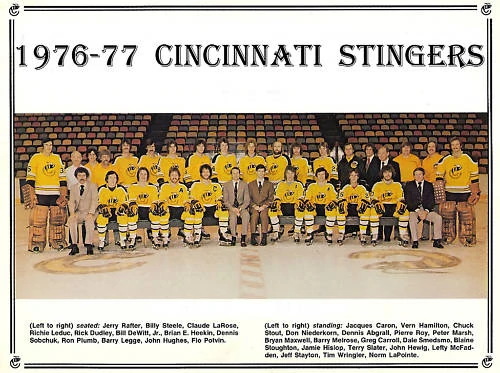The five largest metropolitan regions without NHL franchises are
Other cities that have hosted major professional hockey teams


Cleveland - During the 1970s, Cleveland was home to the Cleveland Barons (the former Oakland Seals), which failed to draw fans or revenue, and was merged with the Minnesota North Stars (now the Dallas Stars) after two seasons.
Cleveland does have an NBA arena (Quicken Loans Arena), that is capable of hosting NHL games. Cleveland, which had a failed franchise for only two seasons, is unlikely to receive a team due to its close proximity to the existing NHL franchise in Columbus, southwest of Cleveland via Interstate 71.


Atlanta - The Atlanta Flames joined the NHL in 1972 and played in the city for eight years before being moved to Calgary in 1980 and becoming the Calgary Flames. The Atlanta Thrashers played in the NHL from 1999 to 2011 until their move to Winnipeg for the 2011–12 season.

Atlanta's Philips Arena was formerly capable of hosting NHL games; the arena has not been used for hockey since the Thrashers' relocation in 2011 and is currently undergoing renovations in order to optimize its sightlines for basketball, leaving the arena less than suitable for the NHL. Should the NHL return to Atlanta for a third time, the next largest hockey-ready arena in Metro Atlanta, the Infinite Energy Arena in Duluth, currently the home of the ECHL's Atlanta Gladiators, is unsuitable for long-term use by a prospective NHL franchise due to being undersized at 11,300 seats.


Kansas City - The Kansas City Scouts joined the NHL in 1974 and relocated to Denver after two unsuccessful seasons, becoming the Colorado Rockies in 1976. The Rockies subsequently moved to the New York/New Jersey region to become the New Jersey Devils in 1982.
Kansas City opened an NHL-ready arena named the Sprint Center in 2007. The arena is managed by the Anschutz Entertainment Group (AEG), which owns the Los Angeles Kings, among other sports interests. In 2007, when the Pittsburgh Penguins faced financial troubles and no prospect of a new arena, the president of AEG offered to relocate the team to Missouri to play in the new Sprint Center rent-free and to become managing partners in the facility. The Penguins, however, remained in Pittsburgh and got their new arena in 2010.
Kansas City sports investor Lamar Hunt Jr. called the NHL's $500 million price tag for an expansion franchise "a ridiculously big fee," and said that he is not aware of anyone in Kansas City who will make a push for a team. Neither he nor Cliff Illig, co-owner of MLS's Sporting Kansas City, have any intention of bidding in the NHL expansion window.

Cincinnati - The Cincinnati Stingers of the World Hockey Association (WHA) existed from 1974 until 1979, and were the final cut from the WHA/NHL merger of 1979 despite having a loyal fanbase.
Among NBA cities lacking an NHL franchise, Portland (Moda Center), and Orlando (Amway Center) have arenas capable of hosting NHL games. However, Orlando would be unlikely to receive a franchise due to its close proximity to Tampa and its franchise via Interstate 4. Other arenas are specifically designed for NBA franchises such as San Antonio's AT&T Center.


Milwaukee – The City has been considered at times for an NHL team due to the popularity of hockey in Wisconsin; the city's BMO Harris Bradley Center, scheduled to be replaced by the Wisconsin Entertainment and Sports Center in 2018, had the capacity to host an NHL team, and the notion has garnered support from players. However, Milwaukee has never received a team due to its small market already being home to multiple major pro teams – in addition to the Milwaukee Brewers and Milwaukee Bucks, the market also de facto supports the Green Bay Packers – and (by some observers) its close proximity to Chicago and the Chicago Blackhawks wanting to protect its market. The Milwaukee area already hosts the NHL Nashville Predators' American Hockey League-affiliated development team, the Milwaukee Admirals.
Baltimore - Originally was a "backup" option had one of the Expansion Six not been able to launch in 1967, is today unlikely to get a team due to its close proximity to the Washington Capitals (who play preseason games in Baltimore annually) and Philadelphia Flyers; the main arena in Baltimore, Royal Farms Arena, is both undersized and outdated. Current proposals to replace the Royal Farms Arena don't have attracting an NHL or NBA team in mind.
During the 1990s, the Hampton Roads region of Virginia was in contention for an NHL expansion or relocation, which would have been known as the Hampton Roads Rhinos. Other cities such as Oklahoma City, San Diego, and Portland, Oregon, had expressed interest in landing an NHL team.
1 Houston
2 Atlanta
3 Seattle-Tacoma
4 San Diego
5 Baltimore
Other cities that have hosted major professional hockey teams


Cleveland - During the 1970s, Cleveland was home to the Cleveland Barons (the former Oakland Seals), which failed to draw fans or revenue, and was merged with the Minnesota North Stars (now the Dallas Stars) after two seasons.
Cleveland does have an NBA arena (Quicken Loans Arena), that is capable of hosting NHL games. Cleveland, which had a failed franchise for only two seasons, is unlikely to receive a team due to its close proximity to the existing NHL franchise in Columbus, southwest of Cleveland via Interstate 71.


Atlanta - The Atlanta Flames joined the NHL in 1972 and played in the city for eight years before being moved to Calgary in 1980 and becoming the Calgary Flames. The Atlanta Thrashers played in the NHL from 1999 to 2011 until their move to Winnipeg for the 2011–12 season.
Atlanta's Philips Arena was formerly capable of hosting NHL games; the arena has not been used for hockey since the Thrashers' relocation in 2011 and is currently undergoing renovations in order to optimize its sightlines for basketball, leaving the arena less than suitable for the NHL. Should the NHL return to Atlanta for a third time, the next largest hockey-ready arena in Metro Atlanta, the Infinite Energy Arena in Duluth, currently the home of the ECHL's Atlanta Gladiators, is unsuitable for long-term use by a prospective NHL franchise due to being undersized at 11,300 seats.

Kansas City - The Kansas City Scouts joined the NHL in 1974 and relocated to Denver after two unsuccessful seasons, becoming the Colorado Rockies in 1976. The Rockies subsequently moved to the New York/New Jersey region to become the New Jersey Devils in 1982.
Kansas City, Missouri has hosted NHL hockey before. The Kansas City Scouts played in Kemper Arena from 1974 until 1976. The team averaged only 8,218 in attendance per game in the 17,000-seat arena, leading to the team's sale and relocation to Denver to become the Colorado Rockies. Professional hockey continued at the arena in the form of the minor league Kansas City Blues, followed by the Kansas City Blades and the Kansas City Outlaws. The ECHL's Kansas City Mavericks currently play at the suburban Silverstein Eye Centers Arena in Independence, Missouri.
Kansas City sports investor Lamar Hunt Jr. called the NHL's $500 million price tag for an expansion franchise "a ridiculously big fee," and said that he is not aware of anyone in Kansas City who will make a push for a team. Neither he nor Cliff Illig, co-owner of MLS's Sporting Kansas City, have any intention of bidding in the NHL expansion window.
Cincinnati - The Cincinnati Stingers of the World Hockey Association (WHA) existed from 1974 until 1979, and were the final cut from the WHA/NHL merger of 1979 despite having a loyal fanbase.
Among NBA cities lacking an NHL franchise, Portland (Moda Center), and Orlando (Amway Center) have arenas capable of hosting NHL games. However, Orlando would be unlikely to receive a franchise due to its close proximity to Tampa and its franchise via Interstate 4. Other arenas are specifically designed for NBA franchises such as San Antonio's AT&T Center.

Milwaukee – The City has been considered at times for an NHL team due to the popularity of hockey in Wisconsin; the city's BMO Harris Bradley Center, scheduled to be replaced by the Wisconsin Entertainment and Sports Center in 2018, had the capacity to host an NHL team, and the notion has garnered support from players. However, Milwaukee has never received a team due to its small market already being home to multiple major pro teams – in addition to the Milwaukee Brewers and Milwaukee Bucks, the market also de facto supports the Green Bay Packers – and (by some observers) its close proximity to Chicago and the Chicago Blackhawks wanting to protect its market. The Milwaukee area already hosts the NHL Nashville Predators' American Hockey League-affiliated development team, the Milwaukee Admirals.
Baltimore - Originally was a "backup" option had one of the Expansion Six not been able to launch in 1967, is today unlikely to get a team due to its close proximity to the Washington Capitals (who play preseason games in Baltimore annually) and Philadelphia Flyers; the main arena in Baltimore, Royal Farms Arena, is both undersized and outdated. Current proposals to replace the Royal Farms Arena don't have attracting an NHL or NBA team in mind.
During the 1990s, the Hampton Roads region of Virginia was in contention for an NHL expansion or relocation, which would have been known as the Hampton Roads Rhinos. Other cities such as Oklahoma City, San Diego, and Portland, Oregon, had expressed interest in landing an NHL team.
I am certain that the useful you shared through your post is helpful for individuals. I am inspired with the method for composing. It kept associated me constantly. Keep doing awesome.
ReplyDeletekc mavericks team store